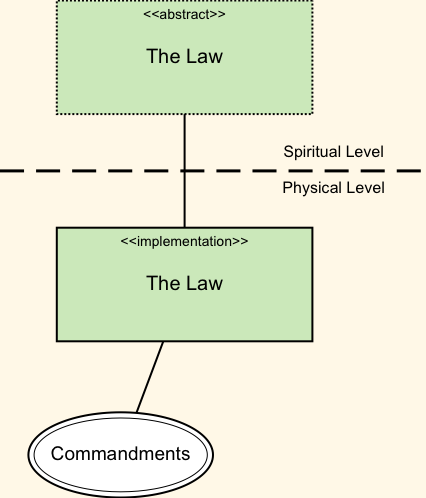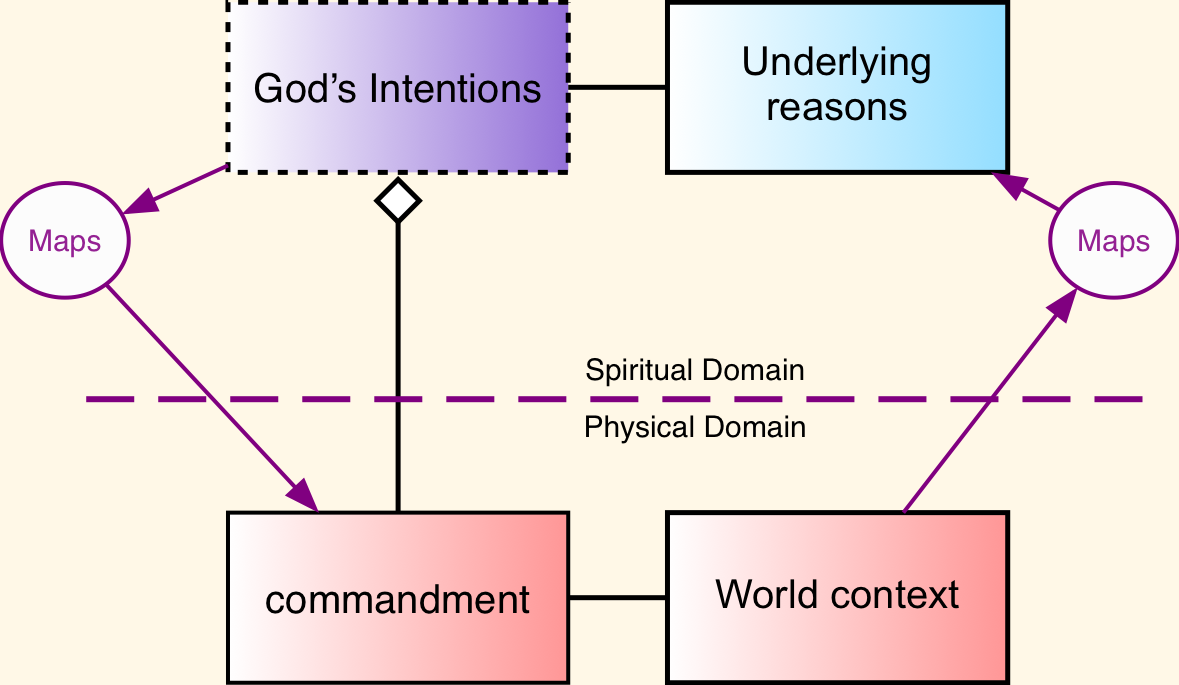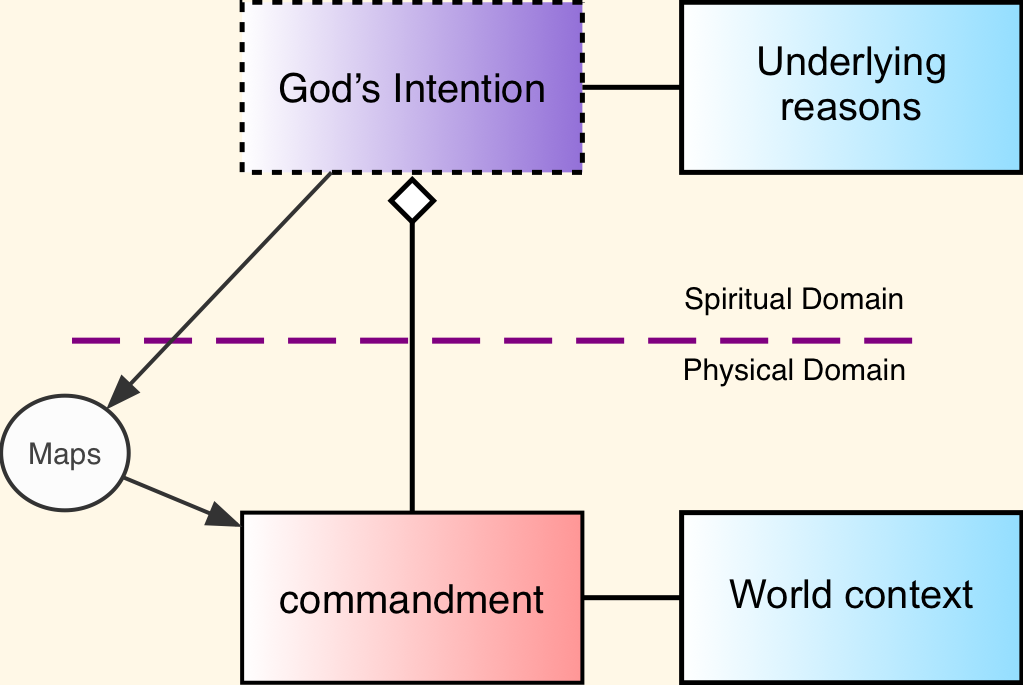 |
Index
|
Index
When the Judgment Day comes, many will say to me,
'Lord, Lord! In your name we spoke God's message,
by your name we drove out many demons and performed many miracles!'
Then I will say to them,
'I never knew you. Get away from me, you wicked people!'
Matthew 7:22-23 GNT
The Messianic Amendment to the Covenant pushed worship to the Spiritual Level. The destruction of David's Tent by the House of Desolation and by Paul et al - together with the destruction of the Temple in 70CE - resulted in the Covenant being unenforceable at the Physical Level.
The Law, of course, remained enforceable at the Spiritual Level. But how could people access it, understand it, and obey it?
With the Covenant accessible solely at the Spiritual Level, it was protected from the machinations of the House of Desolation and from Paul et al. People had a choice as to whether to listen to those who defiled the Covenant, or to go to the source, to the Covenant in the Heavenly Realm.
[Essay: Moralism vs Covenant.]
These words, this warning, is a key to unlocking the operation of the Two Abstract Rules."
The Two Abstract Rules are predicated on:
[Essay: Jesus instructs us to speak to God directly and to discuss matters with Him.]
36 "Teacher, which is the greatest commandment in the Law?"
37 Jesus replied: "'Love the Lord your God with all your heart and with all your soul and with all your mind.'
...
"39 And the second is like it: 'Love your neighbor as yourself.'
"40 All the Law and the Prophets hang on these two commandments."
(Matthew 22:36-37,39-40 NIV)
The greatest commandment:
36 "Teacher, which is the greatest commandment in the Law?"
37 Jesus replied: "'Love the Lord your God with all your heart and with all your soul and with all your mind.'"
(Matthew 22:36-37 NIV)
The second commandment:
"39 And the second is like it: 'Love your neighbor as yourself.'"
(Matthew 22:39 NIV)
36 "Teacher, which is the greatest commandment in the Law?"
37 Jesus replied: "'Love the Lord your God with all your heart and with all your soul and with all your mind.'
...
"39 And the second is like it: 'Love your neighbor as yourself.'
"40 All the Law and the Prophets hang on these two commandments."
(Matthew 22:36-37,39-40 NIV)
It is important to be clear as to the meaning of 'love'. Chambers dictionary:
Paul et al take 'love', as used in Mat. 22:36-40, at face value. Today, we're seeing all too clearly where that leads. Practises condemned by the Lord are being introduced into churches under the guise of 'diversity' or inclusivity' or the 'many routes to God' or 'God loves everyone'.
Paul et al go off the rails, for they see only one commandment; Paul [wrongly] claims that the entire Law amounts to loving one's neighbour:
The entire law is summed up in a single command: "Love your neighbor as yourself." (Galatians 5:14 NIV)
Paul's assertion makes a liar out of Jesus' words (Mat. 22:36-40). There is - nor can there be - any excuse for Paul's conduct.
Paul treats 'love' as a transitive verb as defined in various dictionaries. And because Paul fails to see the logical equivalence between love and obedience in the Covenant Framework, Paul arrives at a false doctrine which has the lord Satan beaming with delight - even more so when Paul et al attribute that false doctrine to the Lord Spirit!
Paul didn't understand the Covenant as Moses understood it. This is hardly surprising since he was educated by teachers condemned to death by Jesus! What is worse is that - in the light of Jesus' comments - Paul neglects to correct His own 'understanding' of the Covenant: it would have been easy for him to interrogate the Twelve.
Analyse Paul's words, and discover for yourself how Paul's incompetence, negligence, and spiritual blindness have led to a corrupt doctrine which deals death to those who believe it. Perhaps, previously, some might claim that they didn't know any better; but now, the exposure of Paul's evil doctrine renders that defence void. In view of the advances in knowledge, understanding, and analysis, one might have expected more from the new-covenant church leaders: but alas they sit around with their heads buried deep in the sand as they continue to spew forth Paul's evil doctrine, mindless of the fate of those they are putting to the sword.
And there it is: on the one hand, there is the House of Desolation who defiantly refuse to accept their Messiah; while on the other, is the predominantly Gentile new-covenant church who defiantly defile the Messianically Amended Covenant, and who continue to peddle Paul's covenant with Death.
[Dissertation: Paul's Covenant with Death.]

"39 And the second is like it: 'Love your neighbor as yourself.'
(Matthew 22:39 NIV)
"And the second is like it."
As might be expected, these words cue a change in the meaning of 'love'. Whereas obedience to God is required, the same cannot be said of one's neighbour!
Had Paul bothered to research Jesus' words with the Twelve when he had the chance, then many lives might not have been lost to his evil doctrine.
The greatest commandment:
36 "Teacher, which is the greatest commandment in the Law?"
37 Jesus replied: "'Love the Lord your God with all your heart and with all your soul and with all your mind.'" (Matthew 22:36-37NIV)

[21] Whoever has my commands and obeys them, he is the one who loves me. He who loves me will be loved by my Father, and I too will love him and show myself to him." [22] Then Judas (not Judas Iscariot) said, "But, Lord, why do you intend to show yourself to us and not to the world?" [23] Jesus replied, "If anyone loves me, he will obey my teaching. My Father will love him, and we will come to him and make our home with him. (John 14:21-23 NIV)
We may paraphrase Jesus' words in John 14:21-23 as follows:
The force of Jesus' statement is the material bi-conditional: 'love' if and only if 'obedience'.

Let's look at the truth table for the expression 'o ⊃ l and l ⊃ o' before looking at Paul's handling of Jesus' statement as recorded in John 14:21-23:
| o | l | o ⊃ l | and | l ⊃ o |
|---|---|---|---|---|
| T | T | T | T | T |
| T | F | F | F | T |
| F | T | T | F | F |
| F | F | T | T | T |
The truth table shows the expression '(o ⊃ l) and (l ⊃ o)' is not one of equivalence, since it can be shown to be false for some interpretation of the variables.
There is no equivalence since, if one variable can be shown to be false, then 'and' is false - that is to say, the expression is not a tautology. If there is to be equivalence, then all interpretations of the variables must be the same. The truth table clearly demonstrates that this is not the case.
However, the story doesn't end there! Let's superimpose the truth table of the Covenant on the logical truth table above, and discover where that leads!
Let's expand the expression.
Jesus said, "If you love God, then you obey God" and "If you obey God, then you love God."
The Prime Axioms of the Covenant state that God does not lie - and, by extension, Jesus (who only does what His Father tells Him to do (q.v.)).
So, within the Covenant Framework:
| o | l | o ⊃ l | and | l ⊃ o |
|---|---|---|---|---|
| T | T | T | T | T |
Since the Lord only speaks the truth, there is no instance when either variable can be false. The expression therefore becomes a tautology.
Necessarily, therefore, within the framework of the Covenant, o ⊃ l and l ⊃ o are equivalent:
| o | l | o ⊃ l | ≡ | l ⊃ o |
|---|---|---|---|---|
| T | T | T | T | T |
So, wherever we come across 'love' within the context of Commandment#1 in the Covenant Framework, then 'obey' can be substituted for 'love'. This is because only those who obey God love God (and, of course, vice versa).
Of course, we could have arrived at such a conclusion directly by invoking the Prime Axioms. But it is encouraging to see and work through the logical aspects!
Jesus wraps it up:
[21] Whoever has my commands and obeys them, he is the one who loves me. He who loves me will be loved by my Father, and I too will love him and show myself to him." (John 14:21 NIV)
Jesus sets the example we all must follow:
[10] If you obey my commands, you will remain in my love, just as I have obeyed my Father's commands and remain in his love. (John 15:10 NIV)
[Essay: The expression 'o ⊃ l ≡ l ⊃ o' falls within the scope of the Prime Axioms.]
[Paul is clearly the originator of the new-covenant doctrine. Which places the unknown writer to the Hebrews in the position of Paul's student - directly or indirectly. We may therefore include the unknown writer's teaching as an extension of Paul's doctrine.
See also FF Bruce - Hebrews]
Paul and the unknown writer to the Hebrews annul the Mosaic Covenant on the grounds that it was:
† 6 He has made us competent as ministers of a new covenant---not of the letter but of the Spirit; for the letter kills, but the Spirit gives life.
7 Now if the ministry that brought death, which was engraved in letters on stone... (2 Corinthians 3:6-7a NIV)
‡ [6] But Jesus has now obtained a more excellent ministry, and to that degree he is the mediator of a better covenant, which has been enacted through better promises. (Hebrews 8:6 NRSV)
‡‡ [6] But Jesus has now obtained a more excellent ministry, and to that degree he is the mediator of a better covenant, which has been enacted through better promises. (Hebrews 8:6 NRSV)
‡‡‡ [7] For if that first covenant had been faultless, there would have been no need to look for a second one. (Hebrews 8:7 NRSV)
‡‡‡‡ [13] In speaking of "a new covenant," he has made the first one obsolete. And what is obsolete and growing old will soon disappear. (Hebrews 8:13 NRSV)
We may paraphrase Jesus' words in John 14:21-23 as follows:
Now, apply Paul's annulment of the Covenant and its Law to Jesus' words.
The annulment of the Mosaic Covenant reduces Jesus' words to an inane tautology (if you love me, you love me). Paul turns Jesus' words into a lie which advances no one's knowledge or understanding, and which benefits no one. Worse, it dishonours the Lord. On its own, this is defiant sin. But Paul attributes this defiant sin to the authority, power, and guidance of the Lord Spirit. And in so doing, Paul turns defiant sin into unforgivable sin - a Blacklistable offence.
[Assignment: Discuss the implications for the new-covenant church.]
The second commandment:
"39 And the second is like it: 'Love your neighbor as yourself.'
(Matthew 22:39 NIV)
There is an order of precedence and of scope with regard to the two great commandments.
Love for God takes precedence over loving one's neighbour. Notice that the second great commandment operates entirely within the scope of the first:
In other words, love for one's neighbour must take place within the framework of one's obedience to God.
'Love' - within the context of Commandment#2 - has the force of 'take care of'. Jesus explains:
[25] Just then a lawyer stood up to test Jesus. "Teacher," he said, "what must I do to inherit eternal life?"
[26] He said to him, "What is written in the law? What do you read there?"
[27] He answered, "You shall love the Lord your God with all your heart, and with all your soul, and with all your strength, and with all your mind; and your neighbor as yourself."
[28] And he said to him, "You have given the right answer; do this, and you will live."
[29] But wanting to justify himself, he asked Jesus, "And who is my neighbor?"
[30] Jesus replied, "A man was going down from Jerusalem to Jericho, and fell into the hands of robbers, who stripped him, beat him, and went away, leaving him half dead. [31] Now by chance a priest was going down that road; and when he saw him, he passed by on the other side. [32] So likewise a Levite, when he came to the place and saw him, passed by on the other side. [33] But a Samaritan while traveling came near him; and when he saw him, he was moved with pity. [34] He went to him and bandaged his wounds, having poured oil and wine on them. Then he put him on his own animal, brought him to an inn, and took care of him. [35] The next day he took out two denarii, gave them to the innkeeper, and said, 'Take care of him; and when I come back, I will repay you whatever more you spend.' [36] Which of these three, do you think, was a neighbor to the man who fell into the hands of the robbers?"
[37] He said, "The one who showed him mercy."
Jesus said to him, "Go and do likewise." (Luke 10:25-37 NRSV)
With regard to the Second Great Commandment, the meaning of the term 'love' is different. In this instance, we are not required to 'obey' our neighbour, but to 'take care' of them.
And so the force of the second great commandment is to 'look after' or 'take care of': this is the force of the narrative of the Good Samaritan (q.v.) and Jesus' explanation of how we are to love our neighbour (Matthew 7:9-12).
[36] "Teacher, which commandment in the law is the greatest?"
[37] He said to him, "'You shall love the Lord your God with all your heart, and with all your soul, and with all your mind.' [38] This is the greatest and first commandment. [39] And a second is like it: 'You shall love your neighbor as yourself.'
[40] "On these two commandments hang all the law and the prophets." (Matthew 22:36-40 NRSV)
How can 'love' (Mat. 22:36-40) possibly be mapped to the 613 commandments, as they are recorded in the ancient Covenant?
It simply isn't possible. Except:
"... when you eat of it your eyes will be opened, and you will be like God, knowing good and evil." (Genesis 3:5 NRSV)
... the new-covenant church leaders eat the lie, become gods knowing good and evil, and publish their interpretations and divinations as church doctrine.

The dictionary definition of 'love' may be summarised as 'some degree of affection'. There is no way that 'affection' can be mapped to the 613 commandments, let alone any others! Unforfunately, there are those in the church who are happy to resort to resort to hardcore finagling in order to get their way.
The dictionary definition of love doesn't work in practise. If anything, it opens the door wide for sin and misuse. So, in order to understand these two commandments it will be necessary to look elsewhere. We allow Jesus to guide our thoughts regarding 'love' as it applies to 'Covenant Law':
So, it is necessary to enquire further into the matter.

The equivalence of 'love' and 'obey', as described by Jesus, allows us to substitute 'obey' in place of 'love' in the First Great Commandment:
4 Hear, O Israel! The LORD is our God, the LORD alone. 5 You shall obey the LORD your God with all your heart and with all your soul and with all your might. (Deuteronomy 6:4-5 (Tanakh))
This is in complete agreement with what Moses said:
"[24] The Lord commanded us to obey all these decrees and to fear the Lord our God, so that we might always prosper and be kept alive, as is the case today. [25] And if we are careful to obey all this law before the Lord our God, as he has commanded us, that will be our righteousness." (Deuteronomy 6:24-25 NIV)
And, unlike Paul, Moses' teaching was authenticated by Jesus Himself:
"[46] If you believed Moses, you would believe me, for he wrote about me. [47] But since you do not believe what he wrote, how are you going to believe what I say?" (John 5:46-47 NIV)
Paul, on the other hand denies the righteousness that comes through obedience to the Law. He replaces 'obedience' with a much more palatable and acceptable 'belief and faith in Jesus':
[21] But now a righteousness from God, apart from law, has been made known, to which the Law and the Prophets testify. [22] This righteousness from God comes through faith in Jesus Christ to all who believe. There is no difference, [23] for all have sinned and fall short of the glory of God, [24] and are justified freely by his grace through the redemption that came by Christ Jesus. (Romans 3:21-24 NIV)
The corollary to Paul's words come from no less a person than Jesus Himself:
[21] "Not everyone who says to me, 'Lord, Lord,' will enter the kingdom of heaven, but only he who does the will of my Father who is in heaven. [22] Many will say to me on that day, 'Lord, Lord, did we not prophesy in your name, and in your name drive out demons and perform many miracles?' [23] Then I will tell them plainly, 'I never knew you. Away from me, you evildoers!'" (Matthew 7:21-23 NIV)

The Two Great Commandments may therefore be rewritten thus:
[Essay: Obfuscation of the Scriptures.]
The two rules are abstract, for they do not explain how we are to obey God; neither do they explain how we are to look after our neighbour.
Recall how, in Sychar at Jacob's Well, Jesus transferred worship in its entirety to the Spiritual Level:
[21] Jesus declared, "Believe me, woman, a time is coming when you will worship the Father neither on this mountain nor in Jerusalem. [22] You Samaritans worship what you do not know; we worship what we do know, for salvation is from the Jews. [23] Yet a time is coming and has now come when the true worshipers will worship the Father in spirit and truth, for they are the kind of worshipers the Father seeks. [24] God is spirit, and his worshipers must worship in spirit and in truth." (John 4:21-24 NIV)
[Essay: The Covenant though unenforceable at the Physical Level, remains enforceable at the Spiritual Level.]
It is because these two rules are abstract, that Jesus is able to say that,
“All the Law and the Prophets hang on these two commandments." (Matthew 22:40 NIV)
These two abstract rules are to be evaluated at the point of need. They are to be evaluated at both the Spiritual and Physical Levels:

Jesus' summary of the Law had a dramatic effect on the Covenant. At a stroke, Jesus replaced some 613 commandments with two abstract rules which, when evaluated together in real-time, could yield an infinite number of commandments! Not surprisingly there was a condition: and that was that the evaluation of those two abstract rules take place simultaneously in real-time in the context of the current state of the Covenant. Without reference to the updated Covenant, evaluation of those great rules will lead to great error. The second great abstract rule is always evaluated within the context of the first great abstract rule.
Jesus' summary was easy to remember; and it allowed people to quickly work out what they should do in any situation in which they found themselves. And this was backed up with the safeguard that any baffling problem could be discussed with the Lord by the priest in charge, and a ruling obtained for the whole church (Deut. 17:8-12 Tanakh) - though, by the time of Jesus, the Covenant was in such a sorry state that this safeguard was dysfunctional.

When the world is falling apart, as the end approaches, people will still be able to take advantage of this feature of the Law - a feature which is backed up by the Spirit's support and guidance in times of need:
And I will put my Spirit in you and move you to follow my decrees and be careful to keep my laws. (Ezekiel 36:27 NIV)
But when he, the Spirit of truth, comes, he will guide you into all truth. He will not speak on his own; he will speak only what he hears, and he will tell you what is yet to come. 14 He will bring glory to me by taking from what is mine and making it known to you. 15 All that belongs to the Father is mine. That is why I said the Spirit will take from what is mine and make it known to you. (John 16:13-15 NIV)
"When you are brought before synagogues, rulers and authorities, do not worry about how you will defend yourselves or what you will say, 12 for the Holy Spirit will teach you at that time what you should say." (Luke 12:11-12 NIV)
What is clear when we look at these two great abstract rules, is that we are not robots micro-managed by God's Spirit (cf, Paul's 'living in the Spirit'); we have been given a degree of autonomy commensurate with our likeness to God:
And God said, “Let us make man in our image, after our likeness. They shall rule the fish of the sea, the birds of the sky, the cattle, the whole earth, and all the creeping things that creep on earth.” (Genesis 1:26 (Tanakh))
This autonomy, however, is not without danger, for with it comes accountability.
In the ancient Mosaic Covenant, the set of commandments was enumerated in the Scriptures. However, as is now the case, commandments may be enumerated by the operation of a set of rules. This is not new! We known that in the case of mathematics - where a set is huge, perhaps even infinite - then enumeration is best arrived at through the operation of a set of rules.
So how does this work in practise in the context of the Messianically Amended Covenant?
Recall how God maps His intentions in the Spiritual Domain to commandments in the Physical Domain:

But with the shift to worship at the Spiritual Level, the Lord Jesus has provided us with these two abstract rules which allow us to carry out the mapping ourselves:

In this way we operate in God's likeness. However, our authority and power are restricted:
Then God said, "Let us make man in our image, in our likeness, and let them rule over the fish of the sea and the birds of the air, over the livestock, over all the earth, and over all the creatures that move along the ground." (Genesis 1:26 NIV)
Since these are abstract rules, there is an assumption of knowledge at both the spiritual and world levels. We are expected to understand the current version of the Covenant at the Spiritual Level; and we are expected to have an understanding of the world in which we live.

Requirements at the Spiritual level:
And at the Physical Level:
[Dissertation: Necessary conditions for the functioning of the Two Abstract Rules.]
Version: 26-Feb-2024